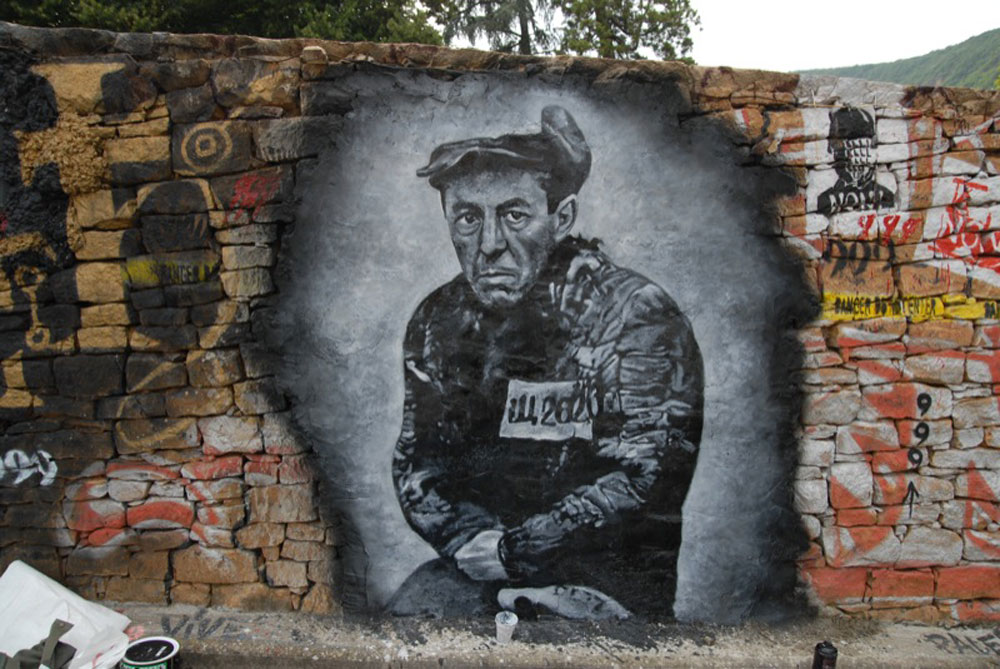
Aleksandr Solzhenitsyn, the Russian writer and Nobel laureate (1970), wrote The Gulag Archipelago, the most complete account of the Soviet Union’s forced labor camps, between 1958 and 1968. He’d been imprisoned in camps between 1945 and 1953 and exiled for three years before his exoneration in 1956. He’d been imprisoned over a false accusation that since he’d been taken prisoner when fighting the Germans in 1945, he was a spy. He was deported from the Soviet Union in 1974, after the publication abroad of the Gulag books (he was arrested, put on a plane, and thought he was being returned to Siberia. The plane landed in Switzerland, where he was let out.)
He lived in Canvendish, Vt., until he returned to Russia in 1994, where he lived in a mansion formerly occupied by Soviet leader Konstantin Chernenko. Solzhenitsyn died in 2008, his reputation by then severely damaged by his own reactionary turn–a habit of great Russian writers in their late years, from Gogol to Dostoevsky to Tolstoy. His turn was on full display in “A Meeting With Solzhenitsyn,” a television talk show on a public channel. He was the host–the show was taped in his study–and most of the time he alone spoke in endless monologues, though he had guests. It did not help his image, by then a beardy blur in the eyes of the younger generation. The show was cancelled after a year. He then became a supported Vladimir Putin.
The following excerpt, written long before then, combines deep sympathy for and understanding of the Ukrainian cause and an undertone of imperiousness that nevertheless leaves open to question whether Solzhenitsyn would have backed Putin’s invasion of Ukraine, launched on Feb. 21. is from volume three of the Gulag, in Harry Willetts’s translation. It was published in the United States by Harper and Row in 1976.
![]()
By Aleksandr Solzhenitsyn
Why are we so exasperated by Ukrainian nationalism, by the desire of our brothers to speak, educate their children, and write their shop signs in their own language? Even Mikhail Bulgakov (in The White Guard) let himself be misled on this subject. Given that we have not succeeded in fusing completely; that we are still different in some respects (and it is sufficient that they, the smaller nation, feel the difference); that however sad it may be, we have missed chance after chance, especially in the thirties and forties; that the problem became most acute not under the Tsar, but after the Tsar — why does their desire to secede annoy us so much? Can’t we part with the Odessa beaches? Or the fruit of Circassia?
For me this is a painful subject. Russia and the Ukraine are united in my blood, my heart, my thoughts. But from friendly contact with Ukrainians in the camps over a long period I have learned how sore they feel. Our generation cannot avoid paying for the mistakes of generations before it.
Nothing is easier than stamping your foot and shouting: “That’s mine!” It is immeasurably harder to proclaim: “You may live as you please.” We cannot, in the latter end of the twentieth century, live in the imaginary world in which our last, not very bright Emperor came to grief. Surprising though it may be, the prophecy of our Vanguard Doctrine [that is, Marxist-Leninist ideology] that nationalism would fade has not come true. In the age of the atom and of cybernetics, it has for some reason blossomed afresh.
Like it or not, the time is at hand when we must pay out on all our promissory notes guaranteeing self-determination and independence — pay up of our own accord, and not wait to be burned at the stake, drowned in rivers, or beheaded. We must prove our greatness as a nation not by the vastness of our territory, not by the number of peoples under our tutelage, but by the grandeur of our actions. And by the depth of our tilth in the lands that remain when those who do not wish to live with us are gone.
The Ukraine will be an extremely painful problem. But we must realize that the feelings of the whole people are now at white heat. Since the two peoples have not succeeded over the centuries in living harmoniously, it is up to us to show sense. We must leave the decision to the Ukrainians themselves — let federalists and separatists try their persuasions.
Not to give way would be fool- hardy and cruel. And the gentler, the more tolerant, the more careful to explain ourselves we are now, the more hope there will be of restoring unity in the future.
Let them live their own lives, let them see how it works. They will soon find that not all problems are solved by secession.





























JimBob says
He loathed virtually everything about American society even as he camped out here for years. He was the Russian equivalent of our own right wing religious nut jobs…but a hell of a writer nonetheless.